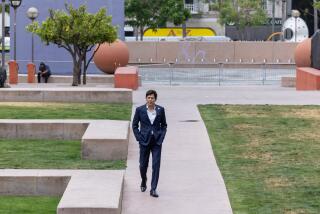The Man Who Never Gave Up
- Share via
The civil rights protests of the 1960s were like the French resistance movement in World War II and the presidential election of 1972 in this one matter: If everyone who said he had stood up to be counted had actually done so, the Fortune 500 would be multihued, the Nazis would never have set one goose-step inside Paris and former President George S. McGovern would be cutting the ribbon for his presidential library about now.
So I’m always a little dubious about such claims, especially nowadays, when anyone’s face can be Zeliged or Gumped into a historical tableau. (Maybe my next Christmas card can show me scanned into that rowboat crossing the Delaware with George Washington, because my protest career didn’t get much more radical than leading the junior honor society in a lunchtime walkout over some dumb American stunt in Vietnam.)
But Arthur Johnson is the real thing--a survivor of Jim Crow, a veteran of sit-ins and bus boycotts--a Florida sharecropper’s son who, like 10 of his 17 siblings, went on to college.
The shape of racism in his father’s time was a boss sticking a gun in his father’s face, saying he could kill him on a whim. In Arthur Johnson’s time, it was being turned down for a chemist’s job in the South because of his color, and moving to enlightened 1960s California, where the supervisor at a Vernon paint factory told him, “There’s three things we don’t hire: We don’t hire black folks, we don’t hire Mexicans and we don’t hire Jews.”
Arthur Johnson’s hero is Martin Luther King Jr., but his motto could be taken from Winston Churchill: “Never give in . . . never give in except to convictions of honor and good sense.” Yesterday, on the weekend before the day the nation has marked to remember King, Johnson, too, was scheduled to take a bow--as co-grand marshal of Gardena’s 14th Annual Dr. Martin Luther King Jr. Commemorative Parade. For if it were not for Johnson, for what he did 25 years ago, there might be no parade.
*
Maybe Johnson thought it’d be easy, and compared to what he’d put up with before, maybe it was. After the bus boycotts and the sit-ins in Tallahassee, after being spat upon by a white man as he walked to chemistry class at Florida A&M;, after moving west and getting ribbed about “busting the block” in Gardena when all he wanted was a nice place for his family to live--saying his piece in front of the Gardena City Council should have been nothing.
It was a November meeting in 1972, and Johnson waited until the public comment part of the meeting to stand up to suggest that Gardena hold a Martin Luther King Jr. observance. “They thought I was crazy”--it would cost too much money, it was only a few years after King was assassinated, on and on.
A few nasty comments were tossed his way, but there were some encouraging ones, too--from a woman named Mary Zucconi, and from Marjorie Delida, a city librarian, who would become Johnson’s partners in this effort. Two weeks later, the council voted 5-0 for a no-cost King Week observance, making Gardena the first city west of the Mississippi to schedule one. By the 1980s, the city was budgeting money for the event, and soon the nation had made King’s birthday a holiday.
*
In April 1968, driving home from his job at Lockheed in Burbank, Johnson turned on the car radio and heard Martin Luther King’s speeches. “I thought it was good that they were doing it, but they continued doing it, and I said: ‘Something must have happened, here,’ and I got home and turned on the TV and realized he had been murdered.”
Johnson has made King’s social yardstick his own, and for each advance, there has been some corollary disappointment. To have changed minds then,” he muses, “that was really hard to do, and we have changed some minds, but we haven’t reached the point I felt we should have by this time.”
Johnson’s brother, who teaches at the University of Florida, has been approached after class by the apologetic grandchildren of the man who shoved a gun in his father’s face many years ago. But out here, when Martin Luther King day comes around, and then Cinco de Mayo, “you can see the kids getting ready to fight each other over it, and I ask myself: ‘Do they really learn what these days are supposed to mean?’ ”
At his age and stage in life--71 and ending about three decades as a schoolteacher and administrator--telling the story begins to supplant the living of it. At the holiday dinner table, he tells his grandchildren about the way things were, and, of course, they are hard-pressed to believe it--the whites-only drinking fountains and back-of-the-bus seats, stories almost as dim and distantly unreal as tales of Harriet Tubman and George Washington Carver and Sojourner Truth. And just as vital to hear, and believe.
More to Read
Sign up for The Wild
We’ll help you find the best places to hike, bike and run, as well as the perfect silent spots for meditation and yoga.
You may occasionally receive promotional content from the Los Angeles Times.







